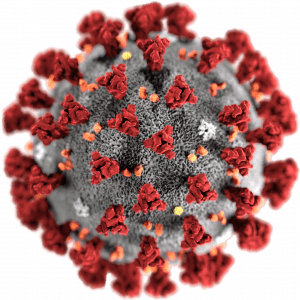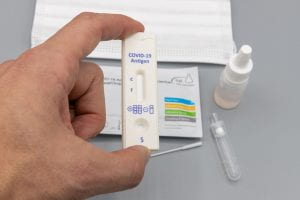A study published by University of Colorado Boulder and Harvard University researchers, states that rapid tests could help the world come close to eliminating COVID-19. The study focused on whether sensitivity of the tests, or turnaround times of getting the results is more important. By using mathematical formulas, different scenarios and three locations (a 10,000 person population, a university setting and in a large city) they came to conclude that when trying to slow the spread, frequency of testing and turnaround time is more important than the sensitivity of the test.
It is important to note the difference between the PCR test and the rapid antigen test. A PCR test, which uses polymerase chain reaction technology (hence the name) to detect traces of the virus’ genetic material. A rapid antigen test does not trace the genetic material but instead looks for specific proteins on the surface of the virus, known as antigens. A PCR test can detect one SARS-CoV-2 RNA molecule for a positive test result, the rapid antigen test needs thousands of virus particles for a positive test result. An antigen is present on the outside of a pathogen. In adaptive response to pathogens, dendritic cells place these antigens on display. The antigens are what allows the T-helper cells to recognize the antigen and trigger the cell mediated and humoral response. Therefore, if your body is fighting against COVID-19, the antigens would be displayed on cells and the rapid test may recognize them.
In one of the scenarios a large city had widespread rapid testing two times a week and they reduced the infections by 80% compared to widespread PCR testing done two times a week that only reduced infection by 58%. This scenario shows that because two thirds of infected people do not show symptoms as they wait for their results they are not quarantining. If people receive the positive tests results sooner, they can self-isolate sooner.
People have felt hesitant about rapid testing since it is less accurate than PCR testing and may miss cases where levels of infected particles are too low. However, it has been shown that there is a short time period where PCR testing will show a positive, and rapid tests won’t. This is because infected particles can go from 5,000 to 1 million in less than 24 hours. During this short window of time it is also likely that the patient is not contagious yet.
Personally, I think that having more accessible rapid tests will be a huge help to curbing the virus. Even with less sensitivity, if a person tests positive then they self-isolate up to up to 48 hours quicker, if tests results take longer, then even more. This means that less people will get infected. I know that when family members have gotten tested, especially in the beginning of the pandemic, tests took 5 days when the labs were backed up. If they had not been properly quarantined during the 5 days, this could pose a danger to others. Therefore, I think that the accuracy can be put aside for the speed of the test results.
So, what do you think? Is rapid testing the inexpensive, fast, key piece to curbing the infection rate, or is the accuracy of tests more important?




Leave a Reply